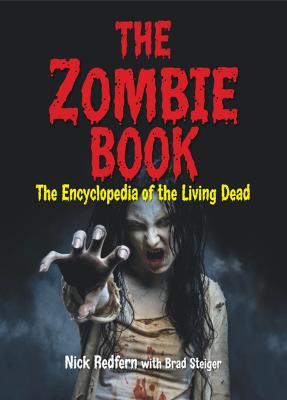ТОП просматриваемых книг сайта:
The Zombie Book. Nick Redfern
Читать онлайн.Название The Zombie Book
Год выпуска 0
isbn 9781578595310
Автор произведения Nick Redfern
Жанр Старинная литература: прочее
Издательство Ingram
Eirian Evans: p. 24.
Jean Gagnon: p. 331.
Nicolas Genin: p. 260.
German Federal Archives: p. 132.
JaSunni: p. 191.
Robert Kirkman: p. 300.
Kobal Collection: pp. 8, 31, 63, 73, 77, 106, 136, 140, 149, 164, 165, 174, 228, 237, 240, 259, 267, 276, 291, 301, 317, 323, 326, 329.
Maciej Lewandowski: p. 205.
Daniel Mayer: p. 50.
Cpt. Muji: p. 202.
Rafael Omondini: p. 183.
Ricardo Pustanio: pp. 16, 22, 33, 54, 167, 252, 269, 270, 302, 306, 321.
Paul Dale Roberts: p. 320.
Seanol: p. 61.
Shutterstock: pp. 11, 27, 37, 39, 41, 46, 47, 57, 61, 78, 80, 83, 100, 118, 122, 184, 193, 249, 313, 327, 332, 336.
David Jolley Staplegunther: p. 97.
Vincent & Bella Productions: p. 295.
Himanshu Yogi: p. 25.
All other images are in the public domain.
INTRODUCTION
The zombie: it is a creature that provokes a wealth of emotional responses: menace, terror, panic, excitement, fascination, and trepidation all share equal, top billing. And it’s not just the actions of the zombie that engineer such states of mind. It’s the very name, too. Indeed, the “Z word” is one that hits home in near-primal fashion. Just mentioning it strikes a deep, chilling, and malignant chord in our subconscious, even if we’re not overly sure why that should be so.
Perhaps it’s the image of the rampaging, utterly driven, killing-machine, violently forcing its way into our homes. Maybe, as a result of the fraught, violent, and unpredictable world in which we now live, it’s the growing association between the dead-returned and matters of a definitively apocalyptic nature. Or, possibly, it’s all due to the sense that the zombie is an unstoppable form of evil; a shambling, marching, or running horror that threatens to overturn society and create a new world in its image, rather than in ours.
In short, the zombie offers us—the human race—one thing and one thing only: extinction. And we know that. As a result, we fear these soulless creatures. Yet, as highly intelligent entities, and ones keenly aware of our own precarious mortality, we find ourselves not just repelled by the zombie, but strangely, and almost hypnotically, drawn to both it and the future it promises of death, decay, and planet-wide devastation. Of course, in today’s society, our perceptions of the zombie are primarily driven by the world of entertainment; that is to say, the likes of The Walking Dead, World War Z, and the Resident Evil movies.
But it hasn’t always been like that. In fact, there was a time long gone when it was nothing like that.
The concept of the zombie has been with us for not just decades or even centuries. It has been an integral part of our myths, legends, folklore, and beliefs for thousands of years. Long before exotic viruses, biological warfare, and sinister military experiments brought the dead back to life in our cinemas and on our television screens, there were the dark spells and incantations of the

